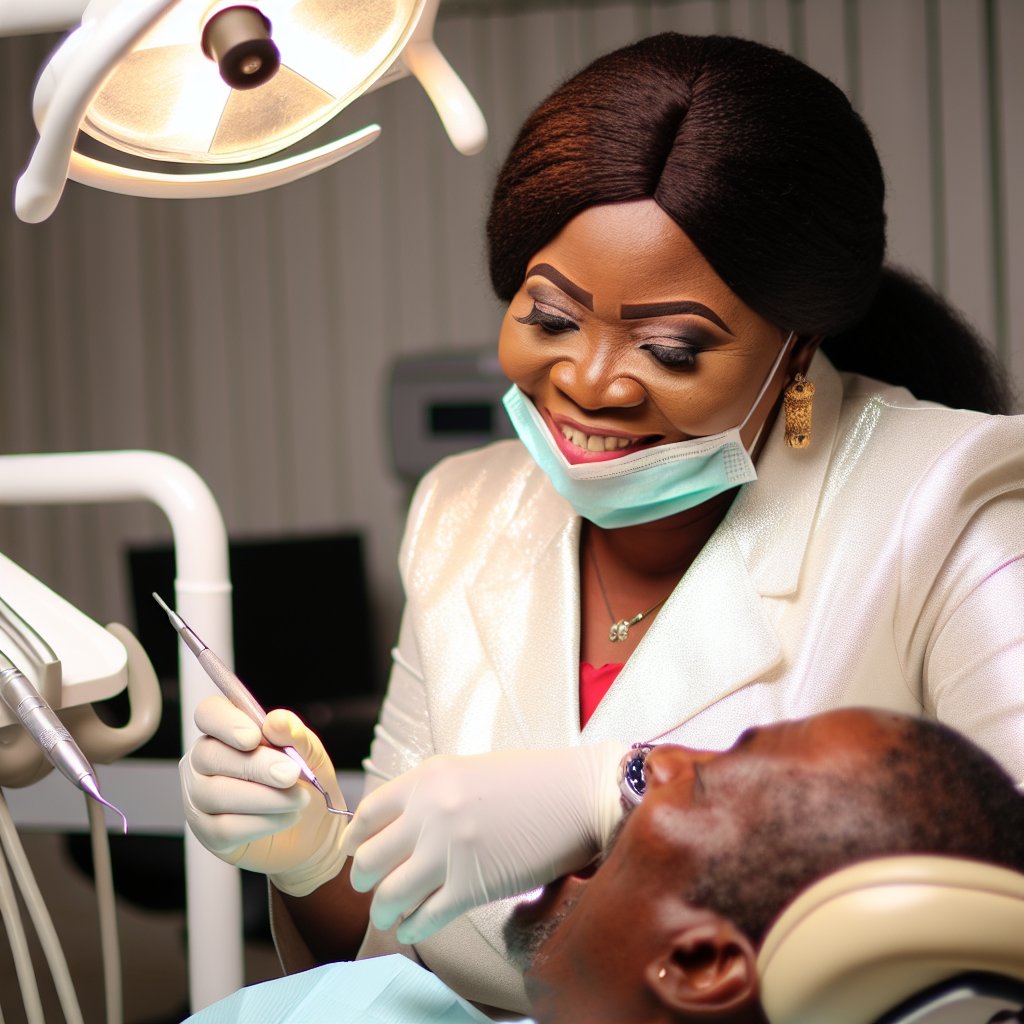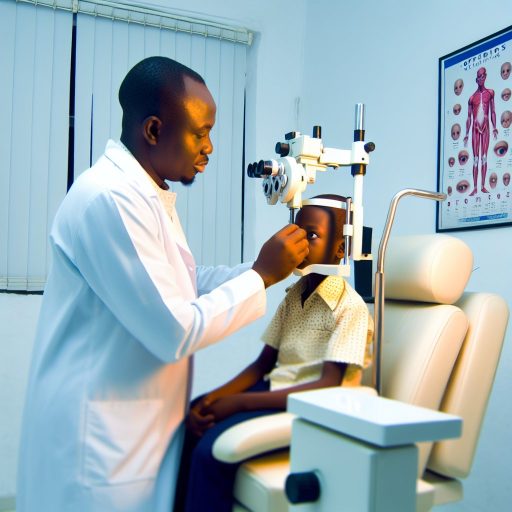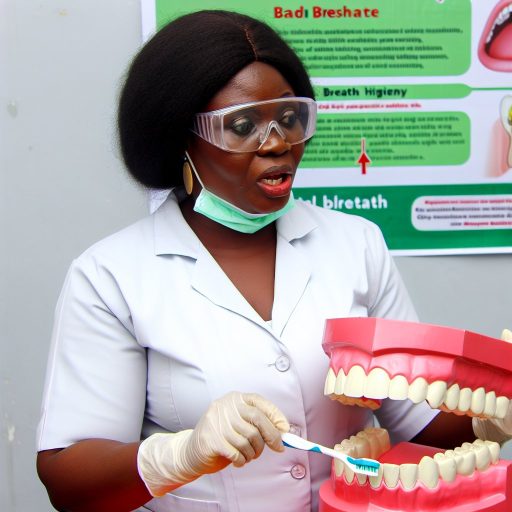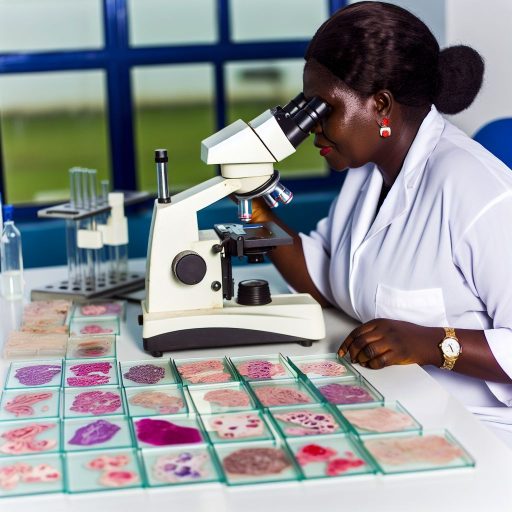Overview of Restorative Dentistry in Nigeria
In Nigeria, restorative dentistry focuses on repairing and restoring teeth to their proper function and aesthetics.
Importance of Restorative Dentistry in Improving Oral Health
Restorative dentistry plays a crucial role in maintaining oral health by addressing issues like cavities, decay, and damage.
Current Challenges Faced in the Field
Some challenges in restorative dentistry in Nigeria include limited access to quality dental care, high costs, and a lack of awareness.
Current State of Restorative Dentistry in Nigeria:
Restorative dentistry in Nigeria faces several challenges that hinder its progress.
Accessibility to advanced dental procedures is a significant issue.
Many Nigerians do not have access to modern equipment and techniques needed for effective restorative treatments.
This often leads to delays in treatment and poorer outcomes for patients.
Additionally, the number of trained restorative dentists in Nigeria is limited.
This shortage of professionals means long waiting times for appointments.
Patients may choose less qualified practitioners or travel abroad for treatment.
The high cost of restorative treatments is another barrier to access.
Expenses associated with dental procedures can be prohibitive for the average citizen.
This financial burden often leads patients to delay or forgo necessary restorative care.
Such choices can have serious consequences for their oral health.
Preventive care can help mitigate the need for restorative procedures.
Promoting good oral hygiene practices and regular dental check-ups can reduce the likelihood of extensive treatments.
Preventive care is essential for maintaining oral health.
It helps prevent the progression of dental problems that may require restorative interventions.
Addressing the challenges faced by restorative dentistry is crucial for the future in Nigeria.
Improving access to advanced dental procedures is one essential step.
Increasing the number of trained restorative dentists is also important.
Moreover, making treatments more affordable is necessary to enhance the quality of care available.
Finally, promoting preventive care practices will reduce the burden of restorative treatments.
Improving overall oral health outcomes in the country is a shared goal.
- Lack of access to advanced dental procedures
- Limited number of trained restorative dentists
- High cost of restorative treatments
- Importance of preventive care in reducing the need for restorative procedures
Opportunities for growth in restorative dentistry:
- Increasing awareness about oral health
- Advancements in technology and materials used in restorative procedures
- Partnership with international organizations for training and resources
- Government support for the development of dental infrastructure
Restorative dentistry in Nigeria is poised for significant growth in the coming years due to various opportunities that exist in the industry.
These opportunities can help advance the practice of restorative dentistry and improve the overall oral health of the population.
Increasing awareness about oral health
One of the key opportunities for growth in restorative dentistry in Nigeria is the increasing awareness about oral health among the population.
As more people become educated about the importance of oral hygiene and regular dental check-ups, the demand for restorative dental procedures is expected to rise.
Advancements in technology and materials
Another opportunity for growth in restorative dentistry is the advancements in technology and materials used in dental procedures.
With the development of innovative tools and materials, dentists in Nigeria can provide high-quality restorative treatments that are efficient and long-lasting.
Partnership with international organizations
Collaborating with international organizations for training and resources is another way to enhance the practice of restorative dentistry in Nigeria.
By partnering with reputable dental associations and institutions, dentists in Nigeria can receive advanced training and access to cutting-edge technologies.
Government support for dental infrastructure
Government support for the development of dental infrastructure is crucial for the growth of restorative dentistry in Nigeria.
By investing in dental clinics, equipment, and training programs, the government can improve access to quality dental care for the population and promote the practice of restorative dentistry.
Discover More: Impact of Climate on Parasitic Diseases in Nigeria
Role of Education and Training in Shaping the Future of Restorative Dentistry:
Continuous education is crucial for practicing dentists to stay updated with the latest advancements in restorative dentistry.
This field is constantly evolving with new techniques and technologies being introduced regularly.
Dentists need to keep up with these changes to provide the best possible care for their patients.
Specialized training programs in restorative dentistry are essential for dentists looking to enhance their skills in this area.
These programs offer in-depth knowledge and hands-on experience that cannot be obtained through traditional dental school education.
Transform Your Career with Expert Guidance
Get personalized mentorship consulting that’s tailored to your unique path. Our expert advice is actionable and exclusive.
Get StartedThey focus specifically on restorative procedures and help dentists master the techniques needed to deliver high-quality results.
Collaboration with dental schools is essential to improve the curriculum on restorative procedures.
By working together, practicing dentists can provide valuable input on what skills are most important in the field of restorative dentistry.
This collaboration can help shape the education of future dentists and ensure they are well-prepared to meet the demands of the profession.
Investing in education and training is crucial for the future of restorative dentistry in Nigeria.
With continuous education, specialized training programs, and collaboration with dental schools, the standards of care can be elevated in this field.
By focusing on these areas, dentists in Nigeria can ensure they provide the best possible care for their patients.
Ultimately, these efforts contribute significantly to the overall advancement of restorative dentistry in the country.
- Importance of continuous education for practicing dentists
- Need for specialized training programs in restorative dentistry
- Collaboration with dental schools to improve curriculum on restorative procedures
Discover More: Career Opportunities for Dental Therapists in Nigeria
Integration of tele-dentistry in restorative dental practices:
Tele-dentistry is the use of telecommunications technology to provide dental care remotely.
In the context of restorative dentistry in Nigeria, integrating tele-dentistry into practices can bring about numerous advantages and challenges.
Benefits of tele-dentistry in reaching underserved populations:
- Improved access to dental care for individuals in rural or remote areas.
- Reduced travel costs and time for patients seeking treatment.
- Expanded reach for dentists to provide services to a wider population.
- Increased convenience for patients who may have mobility or transportation issues.
Use of technology for remote consultations and follow-ups:
- Virtual consultations can help patients discuss their concerns with dentists.
- Follow-up appointments can be done remotely, saving time for both parties.
- Digital tools can facilitate communication between dentists and patients.
- Monitoring treatment progress through tele-dentistry can enhance patient care.
Challenges and regulations in implementing tele-dentistry in Nigeria:
- Lack of infrastructure and internet connectivity in some regions may hinder tele-dentistry implementation.
- Regulatory issues and licensing requirements for providing dental care remotely need to be addressed.
- Data security and patient privacy concerns must be taken into consideration.
- Training and education for dentists on how to effectively use tele-dentistry tools is crucial.
The integration of tele-dentistry in restorative dental practices in Nigeria has the potential to revolutionize the way dental care is delivered.
While there are challenges to overcome, the benefits of reaching underserved populations and improving access to care make it a promising avenue for the future of dentistry in the country.
Discover More: Traditional vs Modern Mental Health Treatments

Importance of Patient-Centered Approach in Restorative Dentistry
Restorative dentistry in Nigeria is evolving.
A patient-centered approach is becoming increasingly crucial in ensuring successful outcomes.
By placing patients at the center of their treatment, dental professionals can enhance the overall experience.
This approach improves treatment adherence.
Patient Education and Involvement in Treatment Decisions
One key aspect of a patient-centered approach is educating patients.
Patients need to understand their oral health conditions and be involved in decision-making.
Providing clear information allows patients to comprehend available treatment options.
This clarity helps them make informed decisions about their care.
When patients are actively involved in treatment planning, they are more likely to comply with recommended treatments.
They will also adopt healthier oral hygiene practices.
This collaborative approach fosters a sense of empowerment and trust.
Such trust between the patient and the dental team leads to better treatment outcomes.
Personalized Treatment Plans Based on Patients’ Needs
Every patient is unique, with individual oral health concerns, preferences, and goals.
To deliver optimal care, restorative dentistry in Nigeria should focus on personalized treatment plans.
These plans must address each patient’s specific needs.
This tailored approach improves treatment outcomes and enhances patient satisfaction.
By considering factors such as oral health history and lifestyle, dental professionals can develop targeted plans.
This prioritizes each patient’s well-being.
A patient-centric approach creates a sense of ownership regarding oral health.
Patients feel encouraged to actively participate in their care.
Enhancing Patient Experience Through Improved Communication and Follow-Up Care
Effective communication is essential in building strong relationships with patients.
Maintaining open communication channels addresses patients’ concerns and alleviates fears.
This approach ensures patients feel valued and respected throughout their treatment journey.
Follow-up care is another critical aspect of a patient-centered approach.
Providing ongoing support and monitoring after treatment ensures satisfaction with results.
It also equips patients to maintain their oral health long-term.
This continuity fosters loyalty and accountability in patients.
Such factors lead to better treatment outcomes and higher patient satisfaction rates.
See Related Content: Community-Based Rehabilitation Programs Nigeria
Addressing disparities in access to restorative dental care:
Initiatives to increase access to affordable dental care in rural and underserved areas
In Nigeria, like in many developing countries, access to restorative dental care is limited, especially in rural and underserved areas.
To bridge this gap, various initiatives have been implemented to increase access to affordable dental care.
- Community outreach programs: Dental professionals organize outreach programs to provide free or low-cost dental care to communities in remote areas. These programs include dental check-ups, cleanings, and basic restorative treatments.
- Public-private partnerships: Collaborations between government health agencies and private dental practices help expand access to restorative care in underserved areas. This model ensures sustainable delivery of dental services to rural communities.
- School-based dental programs: Schools serve as a platform to deliver preventive and restorative dental care to children. Dental professionals visit schools to provide treatments such as dental fillings, sealants, and fluoride applications.
Role of mobile dental clinics in providing restorative treatments
Mobile dental clinics play a vital role in providing restorative treatments to populations with limited access to dental care.
These clinics are equipped with portable dental units and travel to remote areas to deliver essential dental services.
- Emergency dental care: Mobile clinics provide on-the-spot treatment for dental emergencies such as toothaches, abscesses, and chipped teeth. This immediate care prevents escalation of dental problems and promotes oral health.
- Dental education and awareness: In addition to treatments, mobile clinics conduct educational sessions on oral hygiene, preventive care, and the importance of regular dental check-ups. This helps build awareness about oral health in underserved communities.
- Continuity of care: Mobile dental clinics establish regular schedules for visits to remote areas, ensuring continuity of care for patients requiring ongoing restorative treatments. This regular presence enhances access to essential dental services.
Advocacy for government policies to improve access to restorative dentistry services
Advocacy for government policies is crucial to improving access to restorative dentistry services in Nigeria.
By advocating for policy changes and resource allocation, stakeholders can enhance the delivery of dental care to underserved populations.
- Support for dental workforce development: Advocacy efforts can focus on funding training programs for dental professionals in rural areas. By increasing the number of skilled dentists in underserved regions, access to restorative treatments can be improved.
- Integration of dental care into primary healthcare: Advocates can push for the integration of dental services into existing primary healthcare systems. This approach ensures that restorative treatments are accessible alongside other essential health services.
- Legislation for dental insurance coverage: Advocacy for policies mandating dental insurance coverage can make restorative treatments more affordable for low-income individuals. Insurance schemes can enable more people to access quality dental care.
Addressing disparities in access to restorative dental care in Nigeria requires a multifaceted approach involving community initiatives, mobile clinics, and advocacy for policy changes.
By implementing these strategies, the future of restorative dentistry in Nigeria can be more inclusive and equitable.
Future of Restorative Dentistry in Nigeria
The future of restorative dentistry in Nigeria holds great promise and opportunities.
Key points discussed include the need for improved access to quality dental care.
The importance of education and training for dental professionals should also be emphasized.
Furthermore, technology plays a critical role in advancing dental procedures.
Stakeholders must collaborate and work towards enhancing the future of restorative dentistry in Nigeria.
It is crucial for all parties involved to come together to address challenges.
They should implement innovative solutions and drive positive changes in the field.
Collaboration and innovation will shape the future of restorative dentistry in Nigeria.
By working together and embracing new technologies and techniques, the field can continue to evolve.
This evolution will help meet the growing needs of the population.
Overall, unity in purpose and action is essential for the advancement of restorative dentistry.
Additional Resources
Dental education in Africa with special reference to Nigeria
Periodontal Diseases in Adult and Elderly Nigerians: A National …




